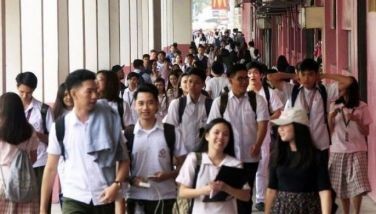Australian cagers end Phl goodwill tour

MANILA, Philippines - The 16-man Australian College of Basketball (ACB) under-20 team leaves Manila for home today with unforgettable memories of teaching the basics of the game to street kids at the Kuya Center in Cubao, getting whipped by Barangay Ginebra in a scrimmage, battling the Mapua senior varsity to a 67-all standoff, experiencing the warmth of Filipino hospitality and spreading goodwill as hoop ambassadors.
The visitors played eight games in a week’s stay. Ginebra gave the youth squad a hard lesson with a 40-point win but the Aussies were competitive against defending four-time UAAP champion Ateneo in losing by six. One of the Aussies’ wins was over Trace College. Their final game was against Trinity yesterday.
Coach Phil Smyth, who played in five World Championships and four Olympics for Australia, said his players are enrolled in a two-year program from where they graduate with an ACB diploma for university qualification. The ACB was established by Stuart Roberts as a private institution in Melbourne last year and has 32 players in the program. Smyth brought the “shorter” players to Manila with 6-1 point guard Deng Majok, born in Australia to Sudanese parents, the most promising pro prospect in the team.
Smyth, 54, saw action at the FIBA World Championships in Manila in 1978 and was also here to play in an invitational tournament that featured the Palmeiras Club of Brazil with import Cyrus Mann. He is one of only six Australian cagers to compete in at least four Olympics – the others are Andrew Gaze, Andrew Vlahov, Luc Longley, Shane Heal and Larry Sengstock. A few days ago, Smyth met up with Nic Jorge who coached the Philippine squad at the World Championships in 1978.
“For most of the kids, this is their first trip outside Australia,” said Smyth. “We know how much Filipinos love basketball so we thought it would be an enriching experience for the kids to play games in the Philippines. After two years in ACB, these kids will be ready to play semi-pro ball or enrol in a university in Australia or abroad or even go straight to the NBL (National Basketball League).”
Filipino Danny Martinez, a Letran and UST graduate who migrated to Australia over 40 years ago, arranged the trip as chief executive officer of Basketball New South Wales (NSW). With former La Salle player Ding De Villa, Martinez set up Basketball NSW as the umbrella organization for over 50,000 professional and amateur players. Martinez, 62, said he will bring top NBL clubs and high-level collegiate squads to play exhibitions in Manila in the near future.
“We support what ACB is doing,” said Martinez. “While it is a private school, the Australian government provides some assistance particularly as ACB takes in several indigent kids from the minorities. The school offers a mix of classroom work and basketball training 36 weeks in a year. We suggested taking the kids to Manila because personally, I think exposing them to the US is overrated. Why bring the kids all the way to the US when Manila is much closer and the game is played at a high level, too?”
Of the 16 players in the under-20 squad, nine are of African descent. Accompanying the team to Manila were manager Melissa Wardle and former Olympic cager Steve Breheny. Wardle, 24, played basketball with the Forestville club, teaches sports science and is a physiologist.
At the Kuya Center the other day, Australian Ambassador Bill Tweddell joined the team in reaching out to street kids. The Australian Embassy assisted the Center in constructing a basketball court through its Direct Aid program. The Center has a strong Australian connection with Bro. Paul Murphy as executive director and Sr. Kate O’Neil in the board of directors. Both Murphy and O’Neil are Australians. Games and Amusements Board commissioner Fritz Gaston, the local representative of Basketball NSW, was also at the Center during the visit.
“Sports is a common passion for both Australians and Filipinos,” said Tweddell who swims everyday and used to play rugby and water polo. “The Australian government is doing its part as a long-standing partner and close friend of the Philippines by providing support to organizations that help the youth such as Kuya Center as well as projects that pursue development goals through sports.” Tweddell said A$129 million or the equivalent of P5.6 billion in Australian aid is earmarked for the Philippines this year, double the amount in 2005. The aid is primarily for education but sports is a component.
Tweddell encouraged the exchange of more sports programs between the Philippines and Australia. “International exchanges of this nature benefit both countries and further contribute to the strong bilateral people-to-people links,” he said.
Smyth said ACB’s first visit is the start of more tours to come, hinting that future teams will be bannered by taller and bigger players with possibly former PBA import Lanard Copeland in the coaching staff.
- Latest
- Trending






























